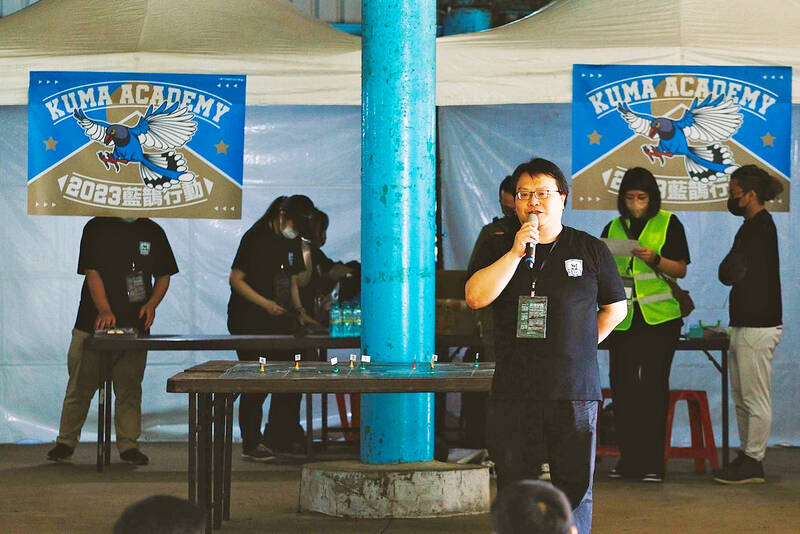The National Security Bureau should investigate the source of funding for influencers and key opinion leaders who post pro-China content that denigrates Taiwan, a researcher said on Monday last week.
A number of Taiwan-based content producers disseminate pro-China content and receive a significant income through donations, ad revenue and other sources, Southern Taiwan University of Science and Technology Institute of Financial and Economic Law director Lo Cheng-chung (羅承宗) said.
“Taiwan protects freedom of speech, regardless of whether you’re pro-unification or pro-independence. However, if that speech is in exchange for money, that’s recognized under law as commercial speech,” he said.

Photo courtesy of Kuma Academy
“If Taiwanese influencers are receiving money from the Chinese Communist Party (CCP) for political advertisement, the Taiwanese government is able to exercise control over that,” he said.
However, the tricky part would be for the government to prove that money was received for the purpose of disseminating Chinese propaganda, he added.
Security officials would have to trace unexplained increases in assets, and expenditures that are inconsistent with the content producer’s income, he said.
“What percentage of the donations of the top 10 content producers in Taiwan comes from China or some other country? If the majority is coming from outside Taiwan, then obviously that’s something that should be investigated,” he said.
China’s propaganda campaign is evolving and rarely involves use of traditional media, instead focusing on social media platforms such as TikTok and YouTube, he said, adding that videos posted there often contain disinformation.
“The CCP pays key opinion leaders to make dozens of videos on everyday topics, and then has them periodically slip in controversial content aimed at spreading its influence,” he said.
“They also don’t just use politics-focused key opinion leaders, they inject pro-China content into all types of channels including everything from celebrity gossip to travel and food-related channels,” he said.
Kuma Academy chief executive officer Ho Cheng-hui (何澄輝) said he also noticed increased CCP activity in social media, as well as evidence that the CCP is training Taiwanese content creators, and is using marketing companies to help it increase the number of Taiwanese followers these creators have.
“There have been reports that the CCP co-opts Taiwanese marketing companies to help it promote pro-China videos,” he said.
“It also uses social media to spread disinformation on key issues like elections in Taiwan, or Taiwan’s pandemic measures,” he said, adding that the government should ban TikTok and other Chinese platforms used by the CCP to spread propaganda.

Taiwan has received more than US$70 million in royalties as of the end of last year from developing the F-16V jet as countries worldwide purchase or upgrade to this popular model, government and military officials said on Saturday. Taiwan funded the development of the F-16V jet and ended up the sole investor as other countries withdrew from the program. Now the F-16V is increasingly popular and countries must pay Taiwan a percentage in royalties when they purchase new F-16V aircraft or upgrade older F-16 models. The next five years are expected to be the peak for these royalties, with Taiwan potentially earning

STAY IN YOUR LANE: As the US and Israel attack Iran, the ministry has warned China not to overstep by including Taiwanese citizens in its evacuation orders The Ministry of Foreign Affairs (MOFA) yesterday rebuked a statement by China’s embassy in Israel that it would evacuate Taiwanese holders of Chinese travel documents from Israel amid the latter’s escalating conflict with Iran. Tensions have risen across the Middle East in the wake of US and Israeli airstrikes on Iran beginning Saturday. China subsequently issued an evacuation notice for its citizens. In a news release, the Chinese embassy in Israel said holders of “Taiwan compatriot permits (台胞證)” issued to Taiwanese nationals by Chinese authorities for travel to China — could register for evacuation to Egypt. In Taipei, the ministry yesterday said Taiwan

‘LIKE-MINDED PARTNER’: Tako van Popta said it would be inappropriate to delay signing the deal with Taiwan because of China, adding he would promote the issue Canadian senators have stressed Taiwan’s importance for international trade and expressed enthusiasm for ensuring the Taiwan-Canada trade cooperation framework agreement is implemented this year. Representative to Canada Harry Tseng (曾厚仁) in an interview with the Central News Agency (CNA) said he was increasingly uneasy about Ottawa’s delays in signing the agreement, especially as Ottawa has warmed toward Beijing. There are “no negotiations left. Not only [is it] initialed, we have three versions of the text ready: English, French and Mandarin,” Tseng said. “That tells you how close we are to the final signature.” Tseng said that he hoped Canadian Prime Minister Mark Carney

POSITIVE DEVELOPMENT: Japan and the US are expected to hold in-depth discussions on Taiwan-related issues during the meeting next month, Japanese sources said The holding of a Japan-US leaders’ meeting ahead of US President Donald Trump’s visit to China is positive news for Taiwan, former Japan-Taiwan Exchange Association representative Hiroyasu Izumi said yesterday. After the Liberal Democratic Party’s landslide victory in Japan’s House of Representatives election, Japanese Prime Minister Sanae Takaichi is scheduled to visit the US next month, where she is to meet with Trump ahead of the US president’s planned visit to China from March 31 to April 2 for a meeting with Chinese President Xi Jinping (習近平). Japan and the US are expected to hold in-depth discussions on Taiwan-related issues during the